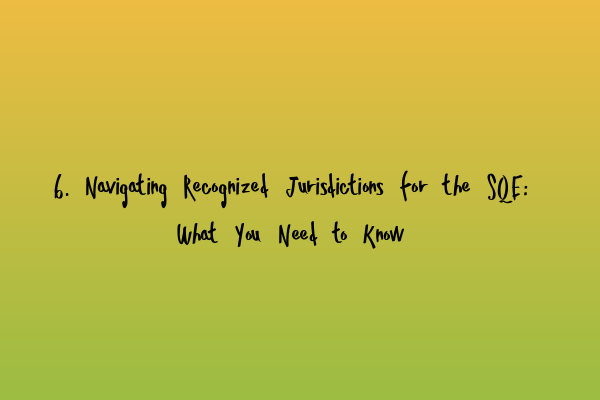6. Navigating Recognized Jurisdictions for the SQE: What You Need to Know
Are you a law student or aspiring solicitor preparing for the Solicitors Qualifying Exam (SQE)? If so, it’s essential to understand the process of navigating recognized jurisdictions. These jurisdictions play a crucial role in your journey towards becoming a certified solicitor. In this blog post, we will provide you with the information and guidance you need to successfully navigate recognized jurisdictions for the SQE. So, let’s dive in!
1. Understanding Recognized Jurisdictions
Before we begin, let’s clarify what we mean by “recognized jurisdictions”. In the context of the SQE, recognized jurisdictions refer to the legal jurisdictions whose qualifications are recognized by the Solicitors Regulation Authority (SRA).
The SRA allows candidates to qualify as solicitors through various recognized jurisdictions, including but not limited to England and Wales. If you hold a legal qualification from one of these recognized jurisdictions, you may be eligible to qualify as a solicitor in England and Wales through the SQE.
2. Key Considerations for Navigating Recognized Jurisdictions
When navigating recognized jurisdictions for the SQE, there are several key considerations to keep in mind:
2.1 Eligibility Criteria
Each recognized jurisdiction may have its own eligibility criteria. It is crucial to thoroughly research and understand these criteria before proceeding. Ensure that you meet the specific requirements set by the recognized jurisdiction you intend to qualify through.
2.2 Recognition by the SRA
Make sure that the jurisdiction you are considering is recognized by the SRA. The SRA regularly reviews and updates the list of recognized jurisdictions, so it’s vital to verify the current status. Check the SRA’s website or consult legal professionals for the most up-to-date information on recognized jurisdictions.
2.3 Language Proficiency
As English law is primarily conducted in English, language proficiency is essential for successful qualification. Ensure that you have a strong command of the English language, especially if it is not your first language. Some recognized jurisdictions may require proof of language proficiency, so be prepared to provide relevant certifications if necessary.
3. Researching the Requirements of Each Recognized Jurisdiction
Now that you understand the key considerations, it’s time to conduct thorough research on the requirements of each recognized jurisdiction. Here’s a step-by-step guide to help you navigate this process:
3.1 Identify Recognized Jurisdictions
Start by identifying the recognized jurisdictions for the SQE. As mentioned earlier, England and Wales is a recognized jurisdiction, but there are others as well. Compile a comprehensive list of all recognized jurisdictions you are eligible to qualify through.
3.2 Access Official Websites
Visit the official websites of each recognized jurisdiction. These websites usually provide detailed information on the qualifying process, eligibility criteria, and any additional requirements. Take your time to browse through the relevant sections and gather as much information as possible.
3.3 Seek Professional Advice
Consult legal professionals or organizations that specialize in assisting candidates with qualifying through recognized jurisdictions. They can provide valuable insights and guidance tailored to your specific circumstances. They may also answer any questions you have and help clarify any doubts.
3.4 Compare and Evaluate
Once you have gathered all the necessary information, it’s time to compare and evaluate. Assess the requirements, eligibility criteria, and any other relevant factors of each recognized jurisdiction. Consider factors such as affordability, convenience, and your personal aspirations.
4. Making an Informed Decision
After thoroughly researching and evaluating the requirements of each recognized jurisdiction, it’s time to make an informed decision. This decision should be based on a careful consideration of your career goals, financial implications, and personal circumstances.
Remember, qualifying through a recognized jurisdiction can open up various opportunities and enhance your professional prospects. However, it’s important to choose a jurisdiction that aligns with your long-term goals and aspirations.
5. Seeking Expert Advice
If you are still uncertain about which recognized jurisdiction to choose or need further clarification, it’s advisable to seek advice from legal professionals, career counselors, or educational consultants. They can provide you with the necessary guidance and help you make an informed decision.
6. Final Thoughts
Navigating recognized jurisdictions for the SQE can be a complex process, but with thorough research and careful consideration, you can make an informed decision that aligns with your goals and aspirations.
Remember to stay up-to-date with any updates or changes in the list of recognized jurisdictions. Regularly visit the SRA’s website or consult relevant professionals for the most current information.
Good luck on your journey towards becoming a certified solicitor through the SQE! With the right preparation and guidance, you are well on your way to achieving your professional goals.

Leave a Reply